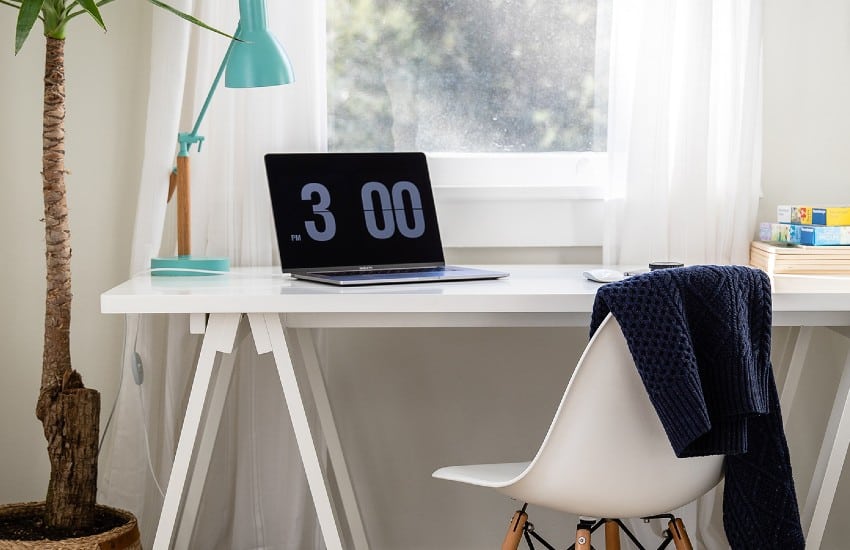How to stay healthy when you’re working from home

Just because you’re working from home doesn’t mean you should stop looking after yourself. In fact, at a time when it’s so easy to lose sight of your usual routine and develop bad habits, it’s more important than ever to practise self-care and stay healthy.
Here are five top tips for maintaining a healthy mind and body while you’re at home.
Eat a healthy, balanced diet and drink plenty of water
If your routine has changed and you’re now spending more time at home, ‘snackcidents’ tend to happen. But it’s important to make sure you consume a wide variety of nutritious foods every day, and limit your intake of foods high in saturated fat, added salt and added sugars.
This is no time to ignore the five building blocks of food – fruit (two serves), veggies (five serves), meat (two to three serves), dairy (two to three serves) and grain (three to six serves). The minimum recommended servings will vary according to your age, gender and life stage. Try and aim for your recommended servings every day, using different products from each of the food groups, so you obtain all the essential nutrients to keep you as healthy as you can.
If you’ve been stocking up on long-life food like frozen and canned fruit or veggies, the good news is these are generally just as healthy as fresh varieties (as long as you try to avoid those produced with added salt or sugar). You can also make delicious smoothies with your frozen fruit and veggies.
Put the canned beans and lentils you’ve bought to good use by adding them to meat dishes. This will mean the dishes will serve more people or you can freeze the leftovers for another day. (You can save frozen leftovers for up to a month.) Try making veggie dishes more often, and add plenty of flavour by using herbs and spices to make them even tastier.
It is important that you remember to drink adequate amounts of fluid every day. Men should aim to drink 2.6 litres (or 10 cups) of water every day, while women should drink 2.1 litres (or 8 cups). Water is the best source of fluid – you can add ice cubes or pieces of fruit to make it tasty.
When you exercise at home, keep in mind that you’ll need to drink extra water to make up for the water you lose. Sports drinks containing electrolytes aren’t necessary, but can be used to rehydrate if you’ve exercised continuously for 90 minutes or more. If in doubt, just drink water.
You may be tempted to eat more discretionary foods – foods that are high in fat, sugar and salt, and include lollies, biscuits, chips, soft drinks. These are occasional foods, and are not required every day. If you stick to a routine of regular meals throughout the day, you should not require snacks in between.
You will have ups and downs as you adjust to your new lifestyle arrangements, whether working from home or being housebound, and if you do fall prey to the temptation of an unhealthy snack, don’t beat yourself up too much over it. Instead, think of it as a well-earned treat, forgive yourself, and then try to get back to being healthy. You may want to plan other strategies to help you avoid unhealthy behaviours – calling a friend; mindful activities or spending time in outdoor spaces.
For more information about good nutrition and food, as well as a variety of recipes you can make at home, visit our recipes.
Get regular physical activity

So, you’ve cut out your daily commute. Why not try fitting in some exercise in the time you’d normally spend sitting in traffic?
Being physically active is about more than just burning kilojoules and building muscle (although those are good goals, too) – it’s also fun, and essential for your continued health and well-being.
There are plenty of great exercises you can do without leaving the comfort of your own home. Explore demonstration videos of workouts for a whole range of skill levels (from beginner to intense) and purposes (from toning and strength to stability and balance).
Ideally, you should aim for at least 30 minutes of movement every day, with muscle-strengthening activities on at least two days each week. But if you’re not doing any exercise at the moment, some is still better than none – start by doing something, and gradually ramp up to the recommended amount.
Since you’re working from home, take advantage of the isolation to blast your preferred workout tunes. Numerous studies have found that listening to music while exercising helps you to stay motivated and cut out distractions. Keep the volume within reason, of course – we’re not recommending you start a fight with your neighbours.
Reduce stress
It is important that we all learn to be aware of our mental health, how we can promote good mental wellbeing and where we can seek help if necessary. Stress can impact anyone – a little bit of stress can be a good thing, whereas ongoing stress is not healthy.
The 24/7 news cycle and social media can be overwhelming at a time like this. The constant stream of reports from a bewildering array of sources is enough to make anyone feel anxious or distressed, so work on cutting out the noise – limit your media intake, amplify positive stories, and seek updates and practical advice from reliable sources like Queensland Health, the Australian Government Department of Health and the World Health Organization at specific times throughout the day.
Make an effort to maintain your social networks. While your physical contact may be limited, it’s never been easier to stay in touch with friends, family and co-workers through email, social media, video conference and telephone.
And remember, you may be working from home, but your work is not your life. Maintain office hours, take regular breaks, and, if possible, establish a dedicated and ergonomic work space.
For more tips on maintaining your mental health, visit Dear Mind, or try out this series of meditations and soundscapes.
Getting a good night’s sleep
With a little time and effort, it is possible to start getting a good night’s sleep and stop hitting the snooze button.
When you’re stuck at home, you might be tempted to stay up late and sleep in until the last possible minute before you need to start your day, but it’s best to stick to a sleep schedule. Adults aged 18-64 years old should aim for 7-9 hours of sleep per night (when you’re over 65, that comes down to 7-8 hours per night). Find your ideal bedtime and stick to it – it’ll do wonders for your circadian rhythm, which is crucial to quality sleep.
Just as your work and your wellbeing will benefit from setting up a dedicated and ergonomic work zone at home, your sleep will benefit from establishing a ‘sleep zone’. Resist the urge to work from bed, no matter how comfy it is, to avoid sending mixed signals to your body about when it’s time to work and when it’s time to sleep.
Switch off your screens and remove electronic devices from your sleep zone – the bright lights emitted by our devices confuse our body clock, disrupt our melatonin levels, and overstimulate our brains when we need to be winding down. If necessary, minimise light with blackout curtains or an eye mask, and block out sound with earplugs or a ‘white noise’ source.
Establish a pre-bed routine that doesn’t involve screens. At least 30 minutes before you go to sleep, wind down by reading a book, taking a warm bath or shower, or putting on music or an audiobook and just listening. Do whatever will let your mind and body know it’s time to relax.
Set an alarm, but don’t be a clock-watcher – watching the clock can make you worry, which will stop you from sleeping. (This is particularly counter-productive if you’re worrying about not getting enough sleep.)
For obvious reasons, you should limit your caffeine intake before you go to bed. The more energised you are, the more trouble you’re going to have sleeping.
Read more advice on sleeping well.
Maintain optimum hygiene practices
Washing your hands is important – but so is food hygiene, especially if you’re going to be making more of your own meals than you’re used to while you’re at home.
Follow the advice from Queensland Health on handwashing and remember:
- Wash and dry your hands carefully before preparing and eating food.
- Make sure you wash all fruit and vegetables thoroughly.
- Keep food preparation areas clean and dry to stop the spread of bacteria around your kitchen.
- Thoroughly wash your chopping boards and utensils in hot soapy water (or in your dishwasher, if you have one).
- Keep chopping boards that have been used for raw meats, chicken and egg separate or washed between preparation or cooking to avoid cross-contamination.
- Thaw food in the fridge, rather than on the bench, and cook it immediately when it’s defrosted.
- Cook all your meals until they’re steaming hot throughout, and if you’re serving chicken, cook it until the juices run clear. Before you eat the chicken, check its thickest part to see that there’s no pink meat.
- When it comes to leftovers, eat them within 24 hours or freeze immediately. When you reheat your leftovers, make sure they’re steaming hot, and only reheat them once.
- If you’re in doubt, throw it out. It’s that simple.
Learn more about hygiene tips and food safety advice.
For many of us, working from home will be a new experience. But by following these tips, you might just look back at it as one that helped you develop good routines and behaviours, and set you on the path to a lifetime of better health – even after you have to go back to the office.


